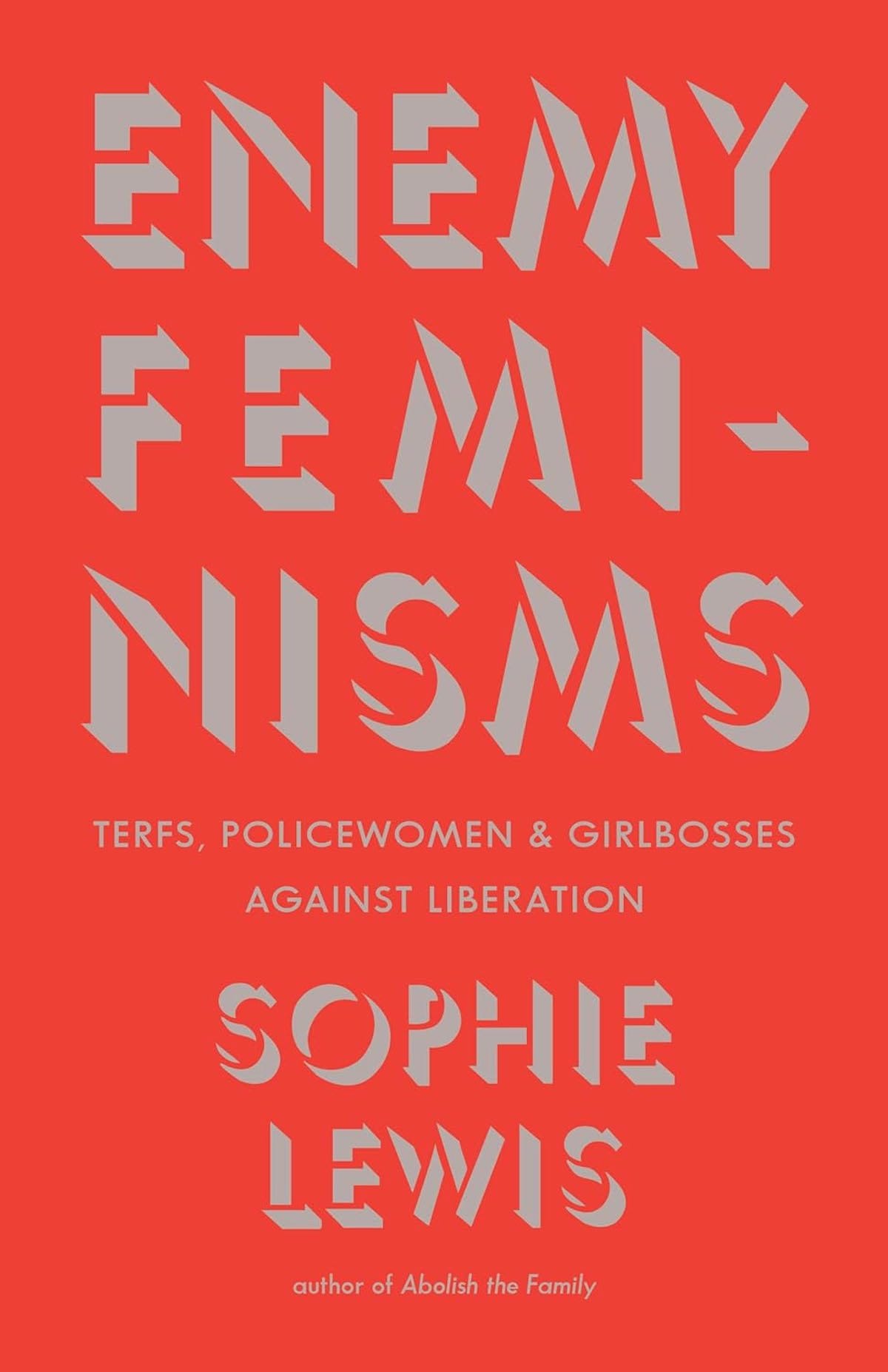When someone’s feminism doesn’t speak for you
A new book about anti-trans feminism

After reading (and writing about) Sophie Lewis’s article in the Fall 2024 issue of Lux Magazine, I got a hold, via NetGalley, of an advance copy of her new book.
Enemy Feminisms: TERFs, Policewomen & Girlbosses Against Liberation will be published by Haymarket on February 18. Lewis, a German-British feminist writer, is a visiting scholar at the University of Pennsylvania.
There’s a lot in this book — it talks about the history of anti-trans movements — but right now I want to talk about what I learned about the meaning of the title, which itself contains great wisdom.
Why recognize some feminisms as enemies?
The title, Enemy Feminisms, responds to the question: Are all types of feminism good by definition, or can we speak coherently of bad feminism? Lewis comes down firmly on the latter side.
“We do not need to say that TERFs aren’t feminist in order to know that they must be stripped of cultural and institutional power,” Lewis concludes.
Many of the people we’re taught to think of as early feminists — white, bourgeois suffragettes in the early 20th century, for example — were anti-Black racists. Instead of building solidarity with diverse groups and related causes, they participated in a discourse that pitted white women against Black men. They asked: Will we achieve gender equality or racial equality first? Who will win rights, and who won’t? It was a discourse that excluded Black women and left them behind.
A bit further into the 20th century, some feminists were fascists. Mary Sophia Allen, for example — a British activist who had vandalized buildings in 1909 to support women’s right to vote and who became a “fanatical police cosplayer” known as Robert to her friends — by 1934 was chatting with Hitler.
Insofar as a woman resists at least one form of patriarchy, intending to help at least some other women, there’s not much to be gained from denying her the label feminist, Lewis argues; if she does harm, it’s better to acknowledge her as an enemy feminist. Suppose a person calls herself a feminist and works with other feminists on projects about voting rights, reproductive rights, and so on. It’ll be hard for us to discuss her and her work while pretending that feminism has nothing to do with anything she’s talking about. If we say that we’re the real feminists and she’s a fake feminist, all we’re doing is insisting that we’re right and she’s wrong, without generating further insight.
There is no such thing, Lewis says, as taking “the side of women.” That concept is so overgeneralized as to be meaningless. Women are not a monolith, and even a monolith has multiple sides. Women have different needs and disagree with each other about which type of feminism is best. Claiming to be on the side (the correct side) won’t settle those arguments.
When a feminism is racist, fascist, colonialist, genocidal, uses terrorist tactics to achieve its goals, seeks to increase women’s power within an oppressive system with little plan of what to do with that power after getting it, or hasn’t fully examined its own internalized sexism, then it’s helpful for us to say: “These so-called feminists do not speak for me.”
Of course, there are some people we can work with, despite our differences. Lewis quotes Bryn Kelly (“Diving into the Wreck,” We Want It All): “To exist in community with people who constantly piss you off is exhausting, but ultimately: worth it.”
And yet, we can’t work with people who hate our goals and whose goals we hate; that’s a “bonkers task.” They’re not trying to be in community with us, and we shouldn’t try to be in community with them.
But we can’t act as though they aren’t part of feminism. Instead, we should “break up the house of feminism.” We need the whole house to “become accountable to itself, mutate and split accordingly, and thrive.”
As I imagine it: Each of us needs to grow, all the time. Some people need to leave, perhaps to return, perhaps not. Some people need to be the ones who learn to ask others to leave. Some people believe they asked someone to leave and later realize they’re the ones who left. All of this is part of the growth.
And, again, the reason for these internal arguments, which may or may not prompt schisms, is that we have real disagreements with people it seems we ought to otherwise be working with.
Unfortunately, Lewis says, there is a “cultural allergy to this kind of self-knowledge.” We’d often rather verbally purge certain people from our ranks and shrug them off, excusing ourselves from understanding what’s going on. After all, once we acknowledge that someone else can be a feminist and also a racist, we rediscover our responsibility for examining our own feminism to prioritize our anti-racism. Increasing awareness leads us to increasing work. Ignorance is tempting because it demands nothing.
Our denial that feminism can do wrong makes it hard to properly recognize an enemy as such and thereafter to properly engage or disengage her. If we refuse to acknowledge that a woman acting in the name of feminism can cause harm, or if we deny that her enemy ideology is a feminism at all, it’ll be hard for us to create a healthy feminism that remains accountable to the possibility that it could go bad. Ultimately, what we’re denying is our own vulnerability. What we’re forgetting is our own history. (Our character too could have a villain arc. We may already have stepped into it. When was the last time we checked?)
Our denial prevents us from discussing, for example, the work of Adrienne Rich (1929–2012), a lesbian poet who — rather out of character — assisted the 1979 launch of Janice Raymond’s anti-trans screed The Transsexual Empire and, over 33 post-publication years, “never publicly sought to repair the harm.” If we simply say that Rich wasn’t acting as a feminist when she did that, how can we have nuanced thoughts about what happened? How do we address our feelings about it? And, when we seek to apply our learning, how can we repair similar ongoing harms that others have caused or in which we may have unconsciously participated?
Being anti-trans surely isn’t inherently feminist, and not all transphobia comes from within feminism. Depending on context, we can also discuss transphobia as anti-feminist. How you recognize and describe transphobia depends on who you’re talking about, what they’re doing, and what you’re trying to say.
Sometimes it’s appropriate to center your feminism — the one in which you believe, the one on which you act — as your primary meaning of that word, feminism, while sidelining that of the enemy feminists. For example, Lewis says that the misogynist efforts “to stamp out transfemininity — and juvenile transmasculinity — in Britain and the US is self-evidently one of feminism’s central contemporary political antagonists.” As we've already recognized, feminists can wield transmisogyny — but doing so is opposed to what Lewis is right here calling feminism. That's how this particular sentence works. Other sentences can say something different.
You can use the word feminism as shorthand to refer to the kind of feminism you like. But it depends on context. It depends what you’re trying to say.
There’s a lot more in this book
Enemy Feminisms contains history of today’s U.S. and U.K. anti-trans movement, and it criticizes other feminisms that have likewise been, well, not very good.
What I wrote above reflects just one underlying idea, as today I feel qualified only to explain the book title. In the book itself, Sophie Lewis offers much more insight and specificity. You may want to read Enemy Feminisms slowly to absorb the theory. It’s a bit of a mind-bender, and it’s a worthwhile endeavor. I recommend that you pick this one up.
I provided affiliate links. Bookshop.org (US) just started selling ebooks, and you can get Enemy Feminisms as an ebook.



